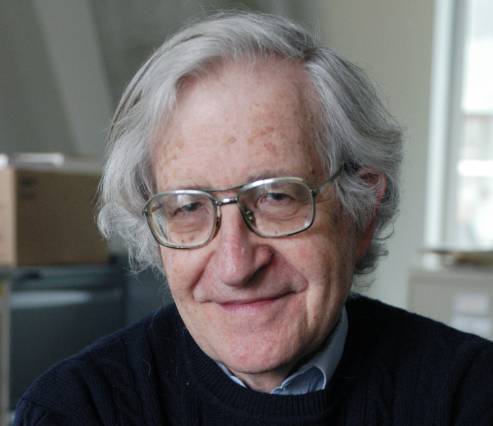Recommended
Institute Professor Emeritus Noam Chomsky, a prolific author, political activist, and philosopher, is one of MIT’s greatest scientists. He created the field of modern linguistics—the scientific study of language—and his political commentaries have sparked controversy and conversation for more than 50 years.
In the January 2015 Faculty Forum Online on Tuesday, January 20, Chomsky will shared insights on his career, took live questions, and discussed the Chomsky Archive, an MIT Libraries project to preserve and digitize the lectures, personal papers, and materials he has donated to MIT.
Watch the interview then share your thoughts in the comments below or on Twitter using the hashtag #MITFaculty.
About Noam Chomsky

Known as the “father of modern linguistics,” Institute Professor Emeritus Noam Chomsky shaped the linguistics field around the profound question, “What does language reveal about the nature of knowledge?” Chomsky joined the MIT faculty in 1955 and was appointed Institute Professor in 1976.
Chomsky has authored more than 100 books on language and politics and is one of the world’s most-cited living scholars.
Chomsky in the Press Noam Chomsky Official Website The Chomsky Archives, MIT Libraries “MIT Libraries receive papers of distinguished linguist, philosopher and activist Noam Chomsky,” MIT News “Unboxing the Chomsky Archive,” MIT News “Chomsky on Russia: ‘The worst-case scenario, of course, would be a nuclear war,’” Salon “Interview with Noam Chomsky on the Crisis in Central America and Mexico,” The Nation @chomsky_quotes, a collection of Noam Chomsky quotes on Twitter
Up to eight times per academic year, the Faculty Forum Online presents interactive interviews with MIT faculty on timely and relevant topics, including nuclear weapons, neuroscience, digital privacy, climate policy, and climate research. Viewers watch and participate in live 30-minute interviews via interactive chat. Since its inception in 2011, archival editions on YouTube and MIT TechTV have been viewed nearly than 100,000 times.









Comments
herman albers
Tue, 01/20/2015 12:38pm
Why have you endorsed Hugo Chavez government and his succesor Maduro, who have shown to be undemocratic, "guys"?
Alan Dubin
Tue, 01/20/2015 2:22pm
As an MIT alumni (class of 1976) I have long been a follower and admirer of your work.
In your discussion this afternoon you seemed to be equating legitimate military action by democratically elected governments with unsponsored acts of violent extremism by self-appointed independent agents supposedly acting in the name of their religion. For example the NATO-led bombing of a Serbian television station in the 1990's versus the unprovoked murder of French cartoonists for their alleged blasphemy against Islam. Is there not a difference between these acts or do you see both types of aggression as morally equivalent?
Kim OBrien
Sat, 01/24/2015 1:21am
I was at MIT about the same time as you in the 'troubles' period.
What he is pointing out is that you see massive protests against the attacks by a few criminal terrorists. (Which the US basically snubbed by not sending someone beyond the US Ambassador to France.) While the killing of 18 journalists by the NATO bombing war in Serbia was basically ignored on the 'justified legal' grounds that they were supplying propaganda assistance. There can be no moral equivalence to these crimes because there is no justification for either.
However a bombing war is much more cruel and terrifying simply because bombing wars create fires and end up targeting civilians despite more 'precise' technology, (dating back to WWII and the Bat program) and so called surgical strikes.
Picture yourself on the ground and unable to do anything about where those bombs will land and then ask yourself will you have enough air to breath should a firestorm develop and will you be spared by a concussion wave that may liquefy your internal organs.
Assurances from Washington or NATO that they are protecting someone by bombing a big city is just ludicrous. What they are doing is destroying one of the most productive ways people can organize themselves.
You now hear Sec. of State Kerry saying "We will certainly not defeat our foes by vilifying potential partners," the top U.S. diplomat said. "We may very well fuel the very fires that we want to put out." What he's talking about is the Royal Saudi Dictatorship which has Sharia Law as its code of conduct.
411
Wed, 02/25/2015 5:36pm
I don't understand your opinion on Hugo Chavez and Maduro... My opinion is that they have made alot to protect their people against international bankers and economic pressure...
Maybe you could clarify what is democracy for you? Do you really think George Bush, Obama, Steven Harper or François Holland are better democrats? o.O
Alan Dubin
Tue, 01/20/2015 2:23pm
I look forward to your reply, Professor Chomsky.
Jay London
Tue, 01/20/2015 11:18am
Thank you for watching today's Alumni Association interview with Professor Chomsky.
Share your thoughts on the interview in these comments or use the hashtag #MITFaculty on Twitter.
Entretien Ménager
Sun, 01/18/2015 7:04am
In a way, Colombia is pretty similar to Afghanistan.... As long as we keep playing the masters in their own country, we will create more bad than any drug cartel... :o\
Noam Chomsky is a real hero! Thanks for your hard work! We must keep it up!!
Camilo García
Thu, 01/15/2015 6:07pm
what do you think about the procese of peace in Colombia? do you think Is possible? why? which possibles solutios in the post-conflict?